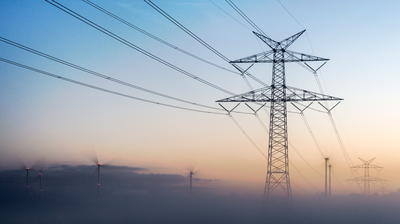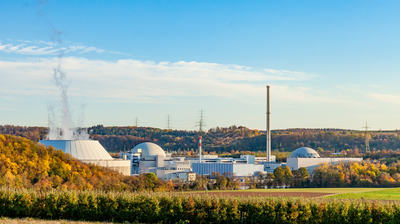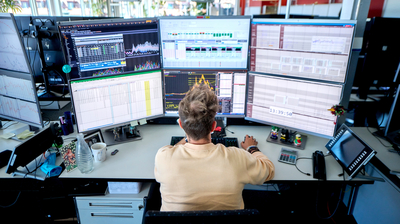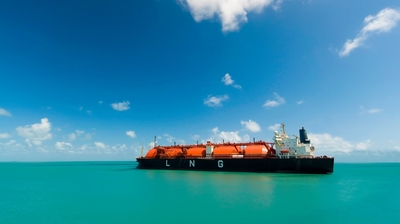It’s Tuesday afternoon in BKW’s trading room at the Bern head office. Around 100 employees are involved in energy trading – some of them in three-shift operations, around the clock, seven days a week. The intraday traders sit at their desks, each with as many as six screens showing price curves and figures from various marketplaces. Ralf Minnig, Head of Intraday Trading: “When I first started at BKW sixteen years ago, trading volumes had just started their sharp rise. Right after the turn of the millennium, there was an atmosphere of downright euphoria,” he reminisces.

Renewable energies need more flexibility
Decarbonization is changing the energy markets towards a production mix that is increasingly marked by renewable energies. Their contribution depends on the time of day and the season – literally on the wind and weather. The quantity of electricity being generated by wind, solar and run-of-the-river power plants in real terms and how much customers are consuming only becomes apparent in the short term. This requires flexible, continuous balancing of electricity supply and demand on international short-term markets by the intraday team. “The demand for flexibility to achieve this balance will increase significantly in line with the expansion of renewable energy production facilities. This means that the optimal use of flexible production will continue to increase in importance. This offers BKW, as a market participant, additional opportunities in energy trading, without losing sight of our focus on supply reliability to our customers, says Ralf Minnig.
In principle, BKW’s energy trading activities comprise three areas: The management and hedging of electricity production from the Group’s own and third-party power plants, the business with customized energy solutions and proprietary trading with standard products. This covers the interacting markets for electricity, natural gas, coal, crude oil, Guarantee of Origin certificates and CO2 certificates and their cross-links to each other. A general overview of international wholesale markets and many years of experience in optimizing electricity generation facilities in combination with a constant market presence in proprietary trading with standard products form the basis for BKW to continue expanding its trading activities – in flexibility markets, for example.
«In conjunction with BKW’s power plants, intraday trading is making an important contribution to reliable electricity supplies, to grid stability and to the energy transition.»
Providing flexibility as a contribution to supply reliability in Switzerland and Europe
With its integrated market perspective and power plant expertise, BKW is in a good position to be able to increasingly provide flexibility services for short-term balancing of electricity production and consumption. By doing so, BKW is meeting a market need that is rapidly increasing in step with the energy transition. In its marketing of flexibility, BKW can build on established processes and an international team. “We use supplies from our own storage power plants and pool together smaller variable facilities. Flexibility is demanded by producers of renewable energies, grid operators as well as energy suppliers and consumers – and at an international level,” explains Ralf Minnig.

Thanks to its central geographical location, BKW is able to offer flexibility services in Switzerland and neighboring countries, and strengthen supply reliability in Europe. BKW is continuing to expand this hub function in trading. An important role is played by intraday trading in this context. “In conjunction with BKW’s power plants, intraday trading is making an important contribution to reliable electricity supplies to customers, to grid stability and to implementing the energy transition,” says Ralf Minnig.









Comments
BKW is open to respectful online dialogue (our netiquette) and welcomes your comments and questions. For questions that do not fit the topic above, please use the contact form.